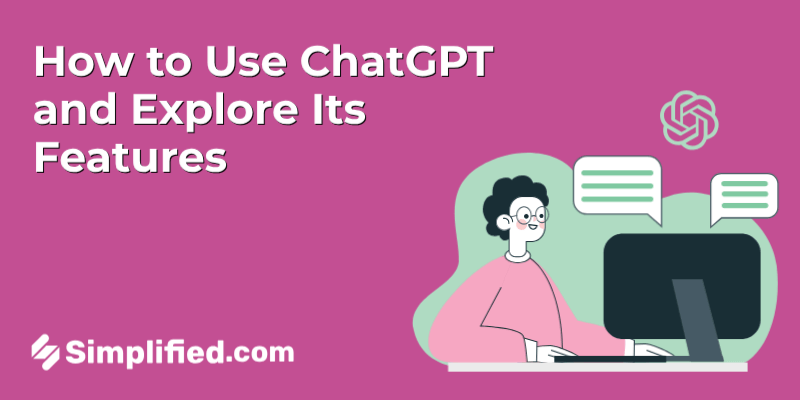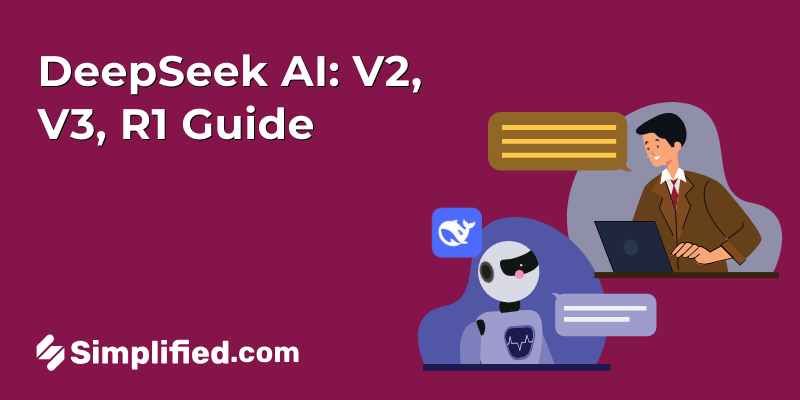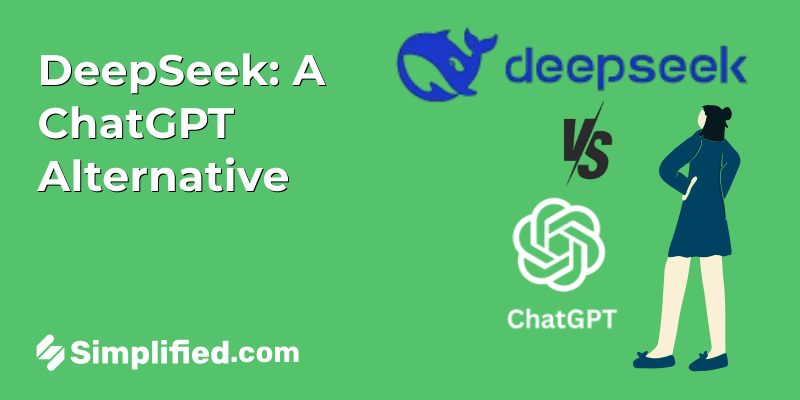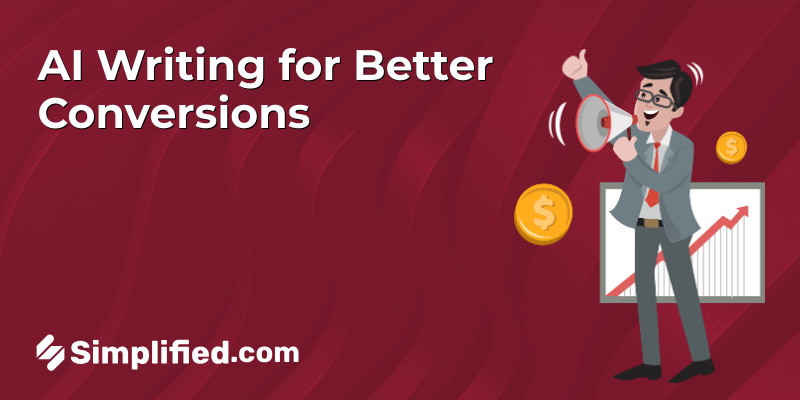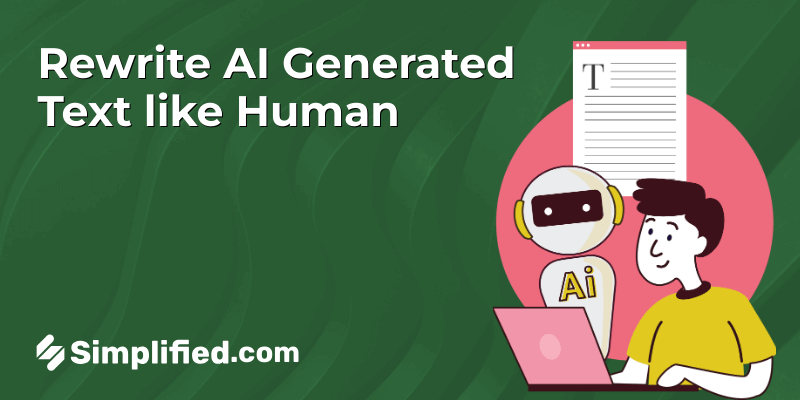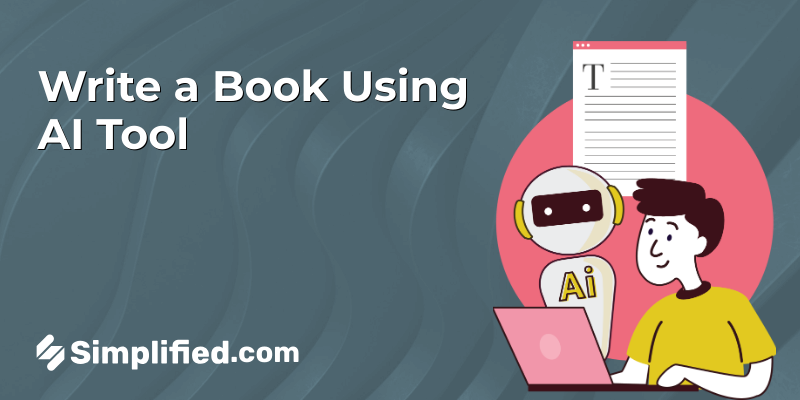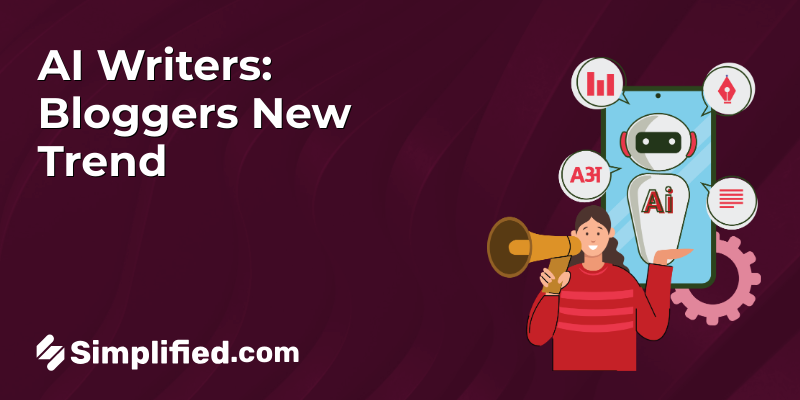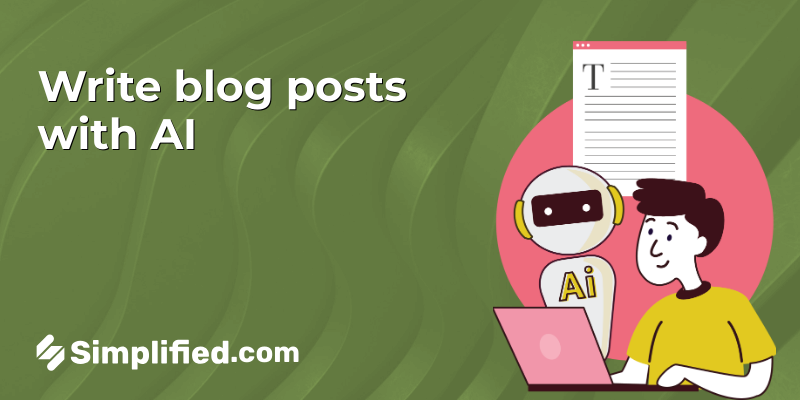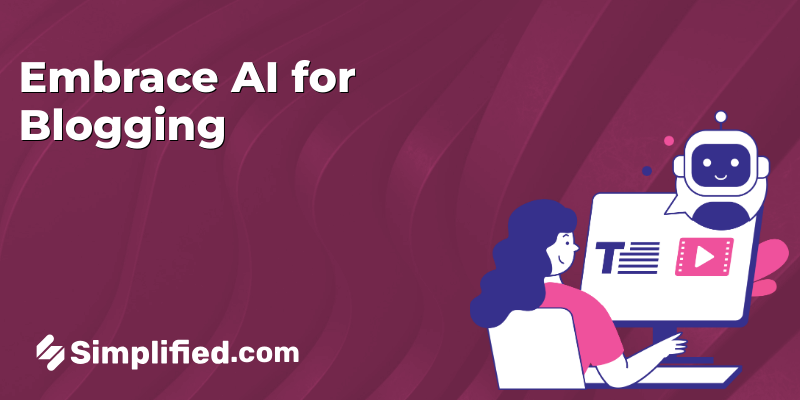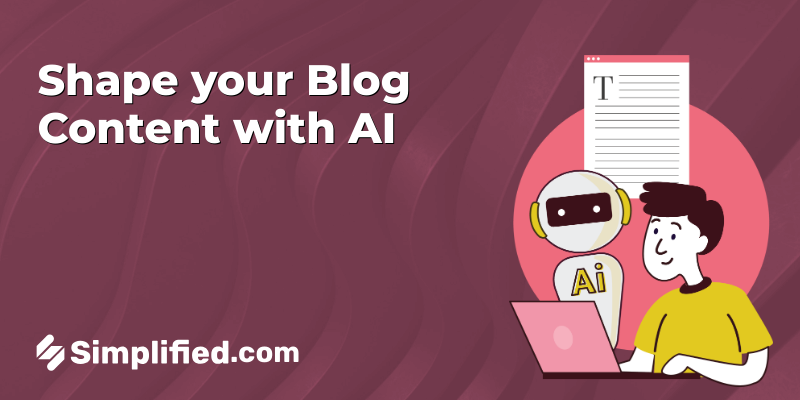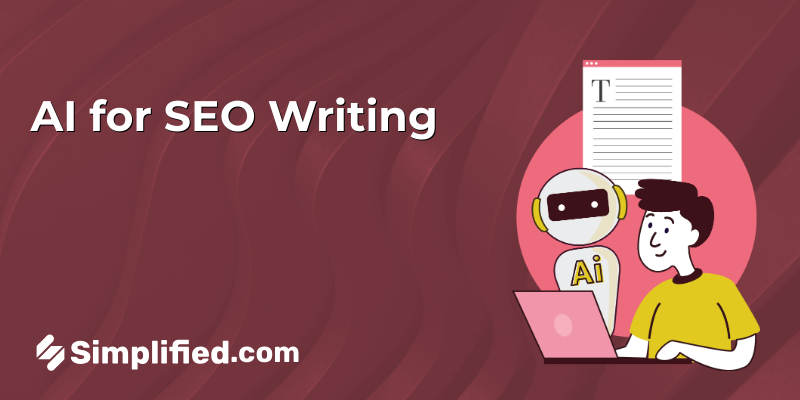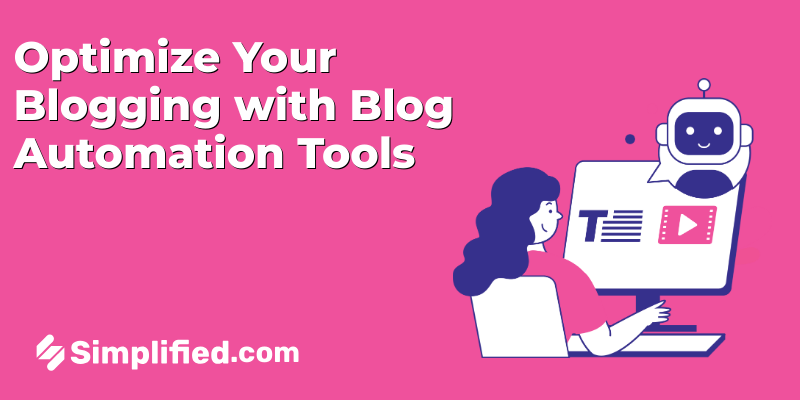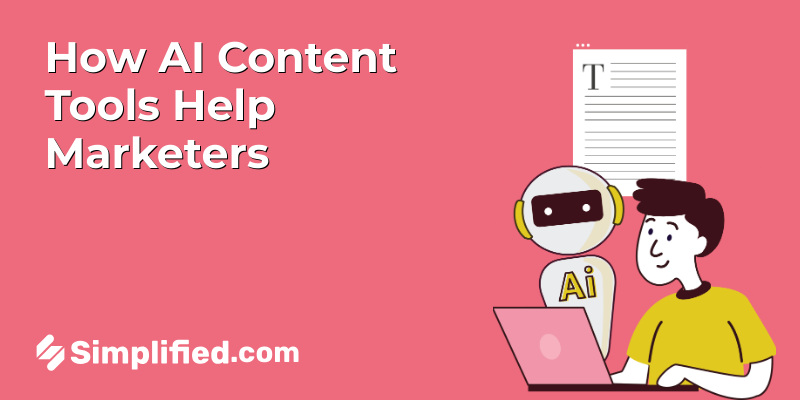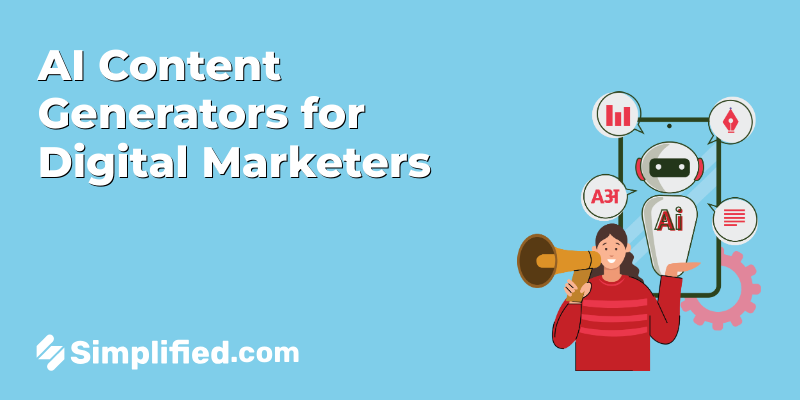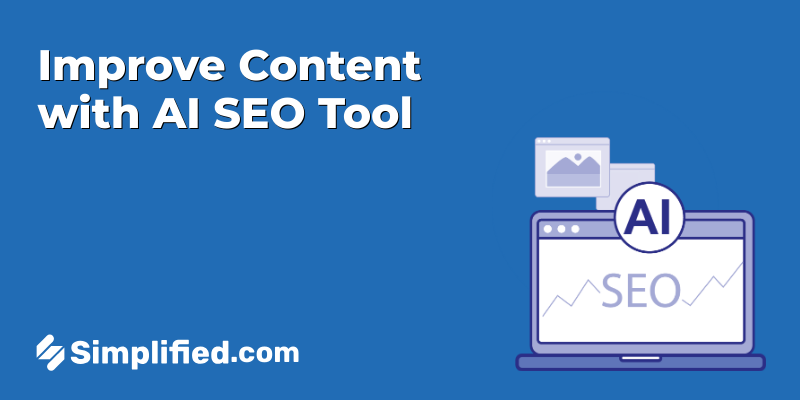
AI writing tools are becoming a useful asset for small marketing agencies. These tools help teams create content quickly and efficiently without the need to hire additional staff. As these tools continue to improve, they allow agencies to handle tasks such as drafting, brainstorming, and editing content. In this blog, we’ll explore how small agencies can use AI writing tools effectively.
What is AI Writing for Small Agencies?
AI writing tools are software programs that help generate and improve written content. They use algorithms to analyze and understand language, allowing them to draft articles, social media posts, emails, and more. For small agencies, these tools can take care of time-consuming tasks, so the team can focus on more creative and strategic activities.
Best AI Writing Tools for Small Agencies
Here are some AI writing tools that can help small agencies manage their content production more effectively, without the need for large teams or complicated processes.
1. Simplified
- Content Creation: Simplified offers a platform that allows agencies to create various types of content, such as blog posts, social media updates, and email templates. It generates text that matches your desired tone and style, helping agencies produce written content quickly.
- Scheduling and Management: The platform includes scheduling tools, so agencies can plan and organize content for social media across multiple accounts, reducing the time spent on manual posting.
Bonus: How AI Writing Tools Can Enhance Your Blogging Process: A Comprehensive Guide
2. ChatGPT
- Quick Drafting: ChatGPT helps agencies create content drafts quickly. It can write blog posts, emails, and social media captions based on prompts, which helps save time during the content creation process.
- Interactive Editing: ChatGPT allows agencies to make quick edits by engaging in a back-and-forth conversation, refining drafts until they meet the desired standard.
- Integration Capabilities: ChatGPT can be integrated with other platforms, making it easy to generate content and adapt it to various needs, all within a seamless workflow.
3. Jasper
- Long-form Content: Jasper excels at generating longer pieces of content, such as blog posts and web pages. This makes it ideal for agencies that need to produce detailed articles or content-rich pages for their clients.
- Search Engine Optimization (SEO): Jasper has built-in tools that assist in optimizing content for search engines, making it easier for agencies to create content that ranks well on Google.
- Content Templates: The platform comes with a variety of templates, making it easy to start new projects and deliver consistent results quickly.
Bonus: AI for SEO: A Marketer’s Guide to Improved SEO Writing
4. Copy.ai
- Versatile Content Options: Copy.ai generates multiple types of content, from blog posts to advertisements and social media content. It’s a flexible tool that can handle a range of writing needs for agencies with diverse clients.
- Customizable Templates: Copy.ai offers a large library of templates to suit different writing projects. Users can also adjust the generated content to better align with specific client needs.
- Expanding Ideas: The tool can take short prompts and expand them into full articles, which is helpful for agencies working under tight timelines.
5. Grammarly
- Grammar and Style Improvements: Grammarly’s primary feature is its grammar and spell checker, but its premium version goes further by providing feedback on writing style, readability, and tone.
- Tone Detection: Grammarly’s ability to assess the tone of content helps agencies ensure that the text fits with the client’s intended brand voice, making it a useful tool for agencies working with various clients.
- Plagiarism Checking: The tool helps ensure the content produced is original by checking for any potential plagiarism issues, which is crucial for agencies that produce large volumes of content.
6.Surfer SEO
- SEO Assistance: Surfer SEO analyzes content and suggests improvements for SEO. It compares your writing to top-ranking content in search results, offering advice on how to enhance keyword usage, structure, and content depth.
- Content Editor: The built-in content editor helps ensure that the text you generate is optimized for search engines, improving the likelihood of ranking higher on search engine results pages (SERPs).
- Real-time Recommendations: Surfer SEO provides actionable advice on improving content, helping agencies ensure that their content strategy is in line with what works for SEO.
Bonus: How AI SEO Content Generators Improve Your Content Strategy
Important Features to Consider When Choosing AI Writing Tools for Small Agencies
- User-friendliness: The tool should be easy to use, allowing team members to quickly adapt and produce quality content without extensive training.
- Adaptability: The ability to modify generated content to fit different tones, styles, and formats is essential for agencies that work with a variety of clients.
- SEO Capabilities: Features that help optimize content for search engines are crucial for agencies that want to ensure their content performs well online.
- Integration with Social Media: Some tools come with social media management features, which can help agencies schedule and manage content across various platforms from one location.
- Collaboration Features: For agencies that work with teams, it’s important to have tools that support collaborative efforts, such as shared access, approval workflows, and content sharing.
By using these AI writing tools, small agencies can improve their content creation processes, handle more clients, and ensure they deliver high-quality work consistently, all while saving valuable time.
Benefits of AI Writing for Small Agencies
- Time Savings in Content Creation
AI writing tools can automate the writing of standard content, such as social media posts, newsletters, and blog outlines. This helps save time, allowing the team to focus on more high-level tasks like strategy development or client communication. - Reduced Costs for Content Production
Small agencies often operate on tight budgets. AI tools provide a cost-effective solution for producing content without needing to hire additional writers. AI can handle the repetitive and routine aspects of writing, leaving humans to manage more complex tasks. - Improved SEO
Many AI writing tools come with features to help optimize content for search engines. This is especially useful for agencies working on client projects where visibility on search engines is a priority. AI can suggest keywords, structure, and formatting that align with SEO best practices. - Consistency Across Platforms
Maintaining a consistent tone and voice across all platforms is a challenge for many agencies. AI writing tools can ensure that the content produced adheres to specific guidelines, making it easier to maintain a consistent brand presence for clients. - Valuable Content Insights
AI tools can analyze existing content to offer insights into what’s working well and what isn’t. These insights can help agencies refine their content strategies and deliver more targeted messages to their clients’ audiences.
Bonus: The Best AI Tools Roundup: 45 Must-Haves
Tips for Using AI Writing Effectively
- Set Clear Guidelines
Establish clear content guidelines for the team Before using any best AI writing tool, . This includes tone, style, preferred formats, and any specific requirements for each client. By providing these parameters, you ensure that the AI-generated content meets the expectations of both your agency and your clients. - Combine AI with Human Input
AI tools can help generate drafts quickly, but human involvement is still necessary for refining the content. The initial draft from AI may be useful, but a human editor can ensure the content is relevant, creative, and aligned with the client’s needs. Combine AI’s efficiency with human creativity for the best results. - Focus on Routine Tasks
AI is best suited for handling repetitive content creation tasks. For example, AI can help agencies create multiple versions of social media posts, generate blog outlines, or create email newsletters. These newsletters can be easily sent using email newsletter software. This allows the team to focus on higher-value tasks such as strategy and client communications. - Stay Informed About Updates
AI writing tools are constantly evolving, so it’s important for agencies to stay informed about new features and updates. By keeping up-to-date with advancements in AI technology, agencies can maximize their investment in these tools and improve their content creation process. - Use AI for Performance Analysis
Some AI tools come with analytics features that help agencies understand which content works best. By reviewing performance metrics, agencies can adjust their content strategies to improve engagement and meet clients’ goals more effectively.
Potential Drawbacks of AI Writing
- Risk of Generic Content
While AI can generate content quickly, it may lack originality. AI-generated drafts often need human editing to make them more unique and aligned with the client’s brand. Without human input, the content may appear repetitive or too formulaic. - Accuracy Concerns
AI-generated content may not always be factually accurate, especially on specialized topics. Agencies should always fact-check the content before presenting it to clients to ensure it’s both accurate and reliable. - Subscription Costs for Premium Features
Many AI writing tools require a subscription to access advanced features. Small agencies should consider their budgets and choose tools that offer the features they need without exceeding their budget. - Over-Reliance on AI
While AI tools are helpful, they should not fully replace human creativity. Content that’s entirely generated by AI may lack the nuanced understanding and creativity that human writers bring to the table. Agencies should use AI as a supplement, not a replacement, for their team’s expertise.
Bonus: How to Write a LinkedIn Post: Best Practices to Improve Rankings?
Looking Ahead: The Future of AI Writing in Agencies
As AI technology continues to improve, the future of writing in small agencies looks promising. New features will likely provide even more support for content creation, allowing agencies to create more personalized and detailed content for their clients. AI may become more adept at understanding context, tone, and brand-specific language, making it an even more valuable tool for agencies.
Small agencies that use AI tools wisely will have a distinct advantage. By reducing the time spent on repetitive tasks, agencies can focus on providing higher-quality content and delivering better results for their clients.
Conclusion
AI writing tools are becoming increasingly important for small agencies looking to improve their efficiency and reduce costs. By using AI tools to handle repetitive tasks, agencies can focus on higher-value work, like strategy and creative content development. While AI can’t replace human creativity, it’s a powerful tool that can help agencies save time, improve consistency, and meet client expectations. When used correctly, AI writing tools are an asset that allows small agencies to compete with larger firms without the need to hire additional staff.


